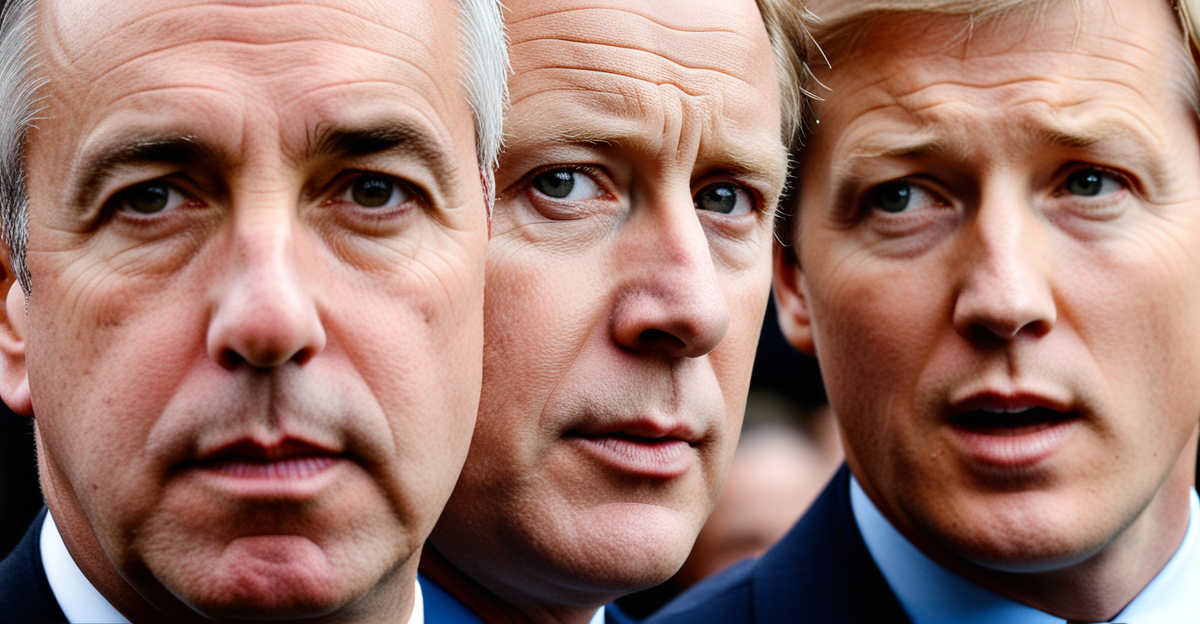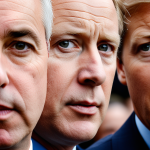Overview of Recent Political Changes in the UK
Recent UK political developments have been marked by significant leadership changes and pivotal UK elections that are reshaping the nation’s strategic direction. The transition in leadership at the head of government has introduced new priorities in domestic and foreign policy, influencing the UK’s stance on global matters. These UK leadership changes often coincide with realigned party dynamics, reflecting public sentiment captured through recent electoral contests.
Significant policy shifts have followed these leadership transitions. Legislative changes now place a stronger emphasis on sovereignty and recalibrating the UK’s role beyond Europe, affecting longstanding diplomatic relationships. For example, initiatives influencing trade policies and international cooperation signal a strategic pivot. By contextualising these developments within the broader UK political landscape, one can observe a trajectory toward greater assertiveness in setting foreign policy agendas.
Have you seen this : What are the essential elements of a minimalist UK home?
This evolving political framework not only influences internal governance but also sets the tone for external relations. Understanding these UK elections and resulting leadership outcomes is essential to grasp the subsequent changes in policy direction. They represent more than just political turnover; they are the foundation upon which new diplomatic and economic strategies are built.
Immediate Implications for UK-EU Relations
Recent Brexit developments continue to heavily influence UK-EU relations, particularly regarding trade and regulatory alignment. Following the significant UK leadership changes, the UK government has sought to assert sovereignty in negotiations, leading to a recalibration of commitments initially outlined in the Brexit agreements. This approach has affected ongoing trade negotiations, introducing uncertainties about tariff arrangements and customs protocols, which are critical to cross-border commerce.
Also read : What role does the UK play in global environmental efforts?
Diplomatic engagement with EU institutions has shifted to a more cautious stance, reflecting the UK’s intent to balance cooperation with maintaining distinct policy autonomy. Major EU member states have responded variably: some advocate for pragmatic dialogue to preserve economic stability, while others adopt a firmer posture, emphasizing adherence to agreed terms to safeguard the single market.
Understanding these dynamics requires contextualising them within the broader trajectory of UK political developments and UK elections that have brought leadership intent to the fore. The evolving UK-EU relations landscape highlights an ongoing negotiation between sovereignty and interdependence, with both sides navigating complex political and economic pressures that will shape future cooperation.
Overview of Recent Political Changes in the UK
Recent UK political developments have been marked by significant shifts in leadership and electoral outcomes, creating a dynamic new chapter for the nation. The UK has experienced notable UK leadership changes, including transitions at the highest levels of government, which have altered the direction of several key policies. Importantly, national and local UK elections have influenced the political landscape, reshaping party dynamics and public priorities.
Policy changes following these leadership transitions have also brought adjustments in legislative focus, particularly affecting the UK’s approach to foreign policy and international relations. These adjustments reflect both domestic pressures and the evolving geopolitical environment, requiring careful reinterpretation of Britain’s role on the global stage.
Contextualising these changes within the broader UK political framework reveals intertwined factors—economic concerns, public opinion, and external diplomatic pressures—that influence decision-making. Such an environment plays a crucial role in setting the tone for upcoming negotiations and alliances, underlining the significance of understanding the recent developments when examining the UK’s current political trajectory.
Transatlantic Relations: The UK and the United States
Recent UK leadership changes have directly influenced the trajectory of UK-US relations, emphasizing a renewed commitment to what is often termed the “special relationship.” This partnership remains a cornerstone of UK foreign policy, with intensified efforts to deepen cooperation across defense, intelligence, and trade sectors. Changes in the UK government have accelerated discussions on new bilateral trade agreements, aiming to complement ongoing negotiations with other global partners.
In defense, the UK has reaffirmed its commitment to joint intelligence sharing and military collaboration, responding to evolving global security challenges. This is particularly relevant as both nations face common threats and seek coordinated approaches through NATO and other forums. Enhanced UK-US collaboration is expected to influence future security policies and diplomatic alignment, reflecting a mutual interest in maintaining strong transatlantic bonds.
Trade negotiations between the UK and US are also notable. The shift in UK leadership prioritizes market access and regulatory alignment, intending to streamline agreements that foster economic growth on both sides. Overall, developments in UK-US relations underscore the strategic intention to ensure continuity and expansion in cooperation, reinforcing the importance of this alliance within the broader framework of UK foreign policy.
Overview of Recent Political Changes in the UK
Recent UK political developments have been characterised by a series of critical UK leadership changes that have reshaped the trajectory of governance and policy-making. These transitions stem notably from pivotal UK elections, such as general and regional votes, which have altered parliamentary compositions and party influence. For example, leadership shifts within major political parties have realigned priorities, affecting both domestic agendas and the UK’s stance on international matters.
The resulting policy shifts have led to legislative changes emphasising sovereignty, economic restructuring, and recalibration of foreign policy. Such adjustments reflect responses to both internal pressures and external geopolitical challenges. Notably, changes in government have prompted a fresh look at the UK’s role on the global stage, with emerging strategies directed towards enhancing international trade and diplomatic relations.
Contextualising these developments within the broader UK political landscape reveals a complex interplay of electoral mandates, party dynamics, and public sentiment. This environment frames ongoing decision-making, underscoring how UK elections and leadership outcomes directly influence policy orientation. Hence, understanding these shifts is crucial for grasping the evolving nature of Britain’s political and international relations frameworks.
Overview of Recent Political Changes in the UK
The recent wave of UK political developments has been largely driven by critical UK leadership changes, which have reshaped the government’s agenda. These transitions followed pivotal UK elections, marking a shift in voter sentiment and party priorities. Leadership turnovers at both national and local levels have created a new dynamic, influencing legislative focus and strategic direction.
A significant result of these developments is a recalibration of foreign policy priorities. New leadership has pursued a legislative agenda that reflects growing emphasis on sovereignty and independent diplomacy. Policy shifts are visible in trade, defense, and international cooperation frameworks, indicating a move to assert the UK’s autonomous role in global affairs. This is not merely a response to internal political shifts but also a reaction to external geopolitical pressures and economic considerations.
Contextualising these changes within the UK’s broader political landscape reveals intertwined causes—from electoral outcomes to evolving party strategies—that frame the nation’s current trajectory. Understanding the interplay between recent UK elections and subsequent government actions is essential for grasping the foundations of ongoing and future policy decisions. This environment continues to inform how the UK negotiates its place in an increasingly complex international order.
Overview of Recent Political Changes in the UK
The recent surge in UK political developments has been largely defined by crucial UK leadership changes following significant UK elections, including general and regional contests that have reshaped parliamentary representation. These leadership transitions involve key figures whose mandates directly influence legislative priorities, resulting in notable policy shifts. Central themes emerging from these changes include renewed emphasis on national sovereignty and recalibration of the UK’s foreign policy stance.
Legislative adjustments consequential to these leadership shifts often focus on both domestic governance and broader international positioning. For instance, these changes have prompted a reassessment of trade policies and diplomatic relationships, reflecting a strategic effort to redefine the UK’s role globally. This is observable in shifts toward more assertive policy-making that aligns with the leadership’s electoral commitments.
Understanding these transformations requires placing them within the broader UK political landscape. The interplay of voter sentiment expressed through UK elections, party realignments, and leadership mandates collectively shapes the policy environment. These factors provide a context for comprehending how leadership changes influence not only domestic agendas but also Britain’s evolving international strategy.
Overview of Recent Political Changes in the UK
Recent UK political developments have been significantly shaped by several pivotal UK elections that resulted in noteworthy UK leadership changes. These elections, including general and regional contests, have altered parliamentary balances and shifted party strategies, impacting political priorities. Leadership transitions have been central in redefining policy agendas, with new administrations emphasizing sovereignty and recalibration of foreign policy objectives.
Legislative changes implemented post-election reflect this shift, focusing on strengthening national autonomy and expanding the UK’s global engagement beyond traditional European frameworks. These changes influence both domestic governance and international outreach, especially in trade and diplomatic relations.
Contextualising these developments within the broader UK political landscape reveals complex interactions between electoral mandates, public opinion, and geopolitical considerations. These factors collectively shape the direction of policymaking, highlighting the dynamic nature of UK politics. Understanding the outcomes of these UK elections and their impact on UK leadership changes is essential for grasping the trajectory of Britain’s evolving role on the world stage and the corresponding adjustments in its foreign and domestic policies.
Overview of Recent Political Changes in the UK
Recent UK political developments have been significantly influenced by a series of crucial UK elections and corresponding UK leadership changes. Key electoral events, such as general elections and important regional votes, have altered the balance of power within Parliament, leading to leadership transitions that directly affect policy direction. These leadership changes have introduced legislative shifts that emphasize sovereignty, economic restructuring, and recalibration of foreign policy priorities.
Notably, policy adjustments following the leadership transitions have led to a focus on redefining the UK’s global role. This includes a strategic move toward asserting independent diplomatic stances and revising trade agreements to better align with new governmental agendas. Within the wider UK political landscape, these changes reflect a complex interaction between electoral mandates, party realignments, and public sentiment. Understanding how recent UK elections have triggered UK leadership changes is vital to appreciating the resulting policy transformations.
This evolving context highlights how shifts in governance influence both domestic and international agendas, setting the stage for ongoing debates about Britain’s position on the global stage and its future foreign policy trajectory.
Overview of Recent Political Changes in the UK
Recent UK political developments have centered on critical UK elections that facilitated substantial UK leadership changes, resulting in a redefined political landscape. Key elections, such as general and regional votes, shifted parliamentary balances, enabling new leadership to set legislative agendas with a pronounced focus on sovereignty and foreign policy realignment.
Following these UK leadership changes, policy shifts prominently emphasize recalibrating Britain’s global role in response to both internal demands and external geopolitical pressures. Legislative adaptations now prioritize strengthening independent diplomacy and revising trade and security frameworks, reflecting the government’s commitment to asserting autonomy in international affairs.
Contextualising these shifts within the UK’s broader political framework reveals a complex interplay between electoral outcomes, party realignments, and public sentiment. These factors collectively influence decision-making processes, underpinning the nation’s strategic direction. The nuanced relationship between UK elections and subsequent leadership decisions highlights how electoral mandates translate into concrete policy transformations. Understanding this dynamic is essential to grasp the trajectory of the UK’s domestic governance and international positioning in an evolving geopolitical environment.



